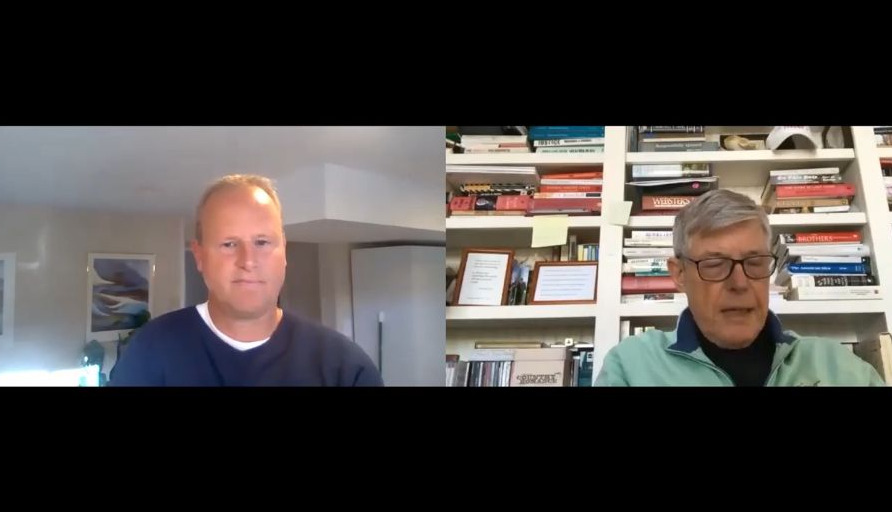In this zoomcast, a partnership with Post Alley, Folio Seattle, and Common Purpose, David Domke and Mort Kondracke discuss the 2020 elections. How will the virus Federal response affect this fall’s election? Trump is characterizing himself as a “war president” in dealing with COVID and is banking on the idea that it will be gone by the fall. But will it? Will the economy recover, helping him to a winning hand? Might he be reelected? And how about the Republicans, hoping to hold the Senate; they’re all in with Trump and if he goes down, perhaps they do too. What does Joe Biden need to do to win? One note: this conversation took place before George Floyd was killed and nationwide protests began last week.
Discover more from Post Alley
Subscribe to get the latest posts sent to your email.

For Mort: Would you please provide the source data behind your statement that “Most polls indicate that by substantial margins (13-15 points) the public:
1) Disapproves of Trumps handling of COVID-19;
2) Distrust what he says about it compared to their state governments; and
3) Thinks everyone should wear a face mask?
What is the sample size, who did those polls, etc?
For David Domke: With regard to the question “What demographic will Biden have to activate…?
… you dismissed the people who “are susceptible to the older Dukakis-esque critic-criticisms of the Democratic Party” as having much influence on which party wins the election? Could you please unpack that very vague description?
You go on to say: “That’s past. We’re in the middle of a pandemic. Goverrnment HAS to function.” Please convince me that those Dikakis-esque criticisms of the Democratic Party have nothing to do with the efficacy of government.
David Domke never answered my question about what he meant when he dismissed the influence of voters “who are susceptible to the older Dukakis-esque critic-criticisms of the Democratic Party”. So… left to my own devices, I researched “Michael Dukakis” on Wikipedia. Here’s what I found:
“Reform Democrats in the United States are members of the Democratic Party who are opposed to the Democratic political machines of their respective cities, counties, or states or to analogous machine politics at a national level. Reform Democrats are generally associated with the good government traditions that arose out of the progressive movement of the early 20th century, and are usually, but not always, on the left wing of the Democratic Party.”
– Excerpt from Topic “Reform Democrats”
“Dukakis was elected governor in 1974, defeating the incumbent Republican Francis Sargent during a period of fiscal crisis. He… pledged to dismantle the powerful Metropolitan District Commission (MDC), a bureaucratic enclave that served as home to hundreds of political patronage employees. The MDC managed state parks, reservoirs, and waterways, as well as the highways and roads abutting those waterways. In addition to its own police force, the MDC had its own maritime patrol force, and an enormous budget from the state, for which it provided minimal accounting. Dukakis’ efforts to dismantle the MDC failed in the legislature, where the MDC had many powerful supporters. As a result, the MDC would withhold its critical backing of Dukakis in the 1978 gubernatorial primary.”
– Excerpt from topic “Michael Dukakis”
Oh dear. I guess I AM a “Reform Democrat”. And David thinks that Reform Democrats will have little impact on the outcome of the upcoming presidential election.
According to David, I’m politically irrelevant because I think BOTH political parties MUST reform themselves – now. Why? Because Americans who identify with one party MUST a) have some trust for the opposing party, b) some basis to trust a neighbor who has different political beliefs than they do, and c) some basis to trust our system of government.
I’m politically irrelevant because I believe that political parties must earn voters’ trust by becoming more transparent about who makes what party decisions behind the scenes. I’m politically irrelevant because I think my party should let the primary process play out – without interfering (think: “Bernie vs. Hilary in 2016”). I’m politically irrelevant because I think our press should not be afraid to investigate WHY a large group of qualified Democratic candidates suddenly withdrew from the 2020 race for President – leaving Biden (my least-favorite candidate) as the only Democrat in the running. Last but not least, I’m politically irrelevant because I think our political parties should actively SUPPORT a voter’s right to privacy – EVEN if that means doing without the conveniences of micro-targeting data (think: “Cambridge Analytica”).
(Yes, micro-targeting DOES make it possible to target overly simple campaign messages to single-issue voters. Yes, micro-targeting DOES make it possible to predict how voters will vote. Yes, it IS possible that an additional investment in micro-targeting can determine who wins an election. But. Does that mean that continuing to collect and use political micro-targeting data is the ethical thing for our political parties to do – given how easily the data they collect can be misused?)
Will my dissatisfaction with the Democratic Party’s platform (and behind-the-scenes manipulation of our electoral process) drive me to vote for President Trump? No/well… maybe.
Could Joe Biden’s terrible speaking skills (and/or his refusal to participate in our upcoming Presidential debates) become the proverbial “straw that broke the camel’s back”, i.e., the reason I vote for President Trump in 2020? Yes.
I think what every American must ask themselves, is why the DNC chose their weakest and most frail candidate to represent the party. At the time the entire field pulled out, Biden was clearly losing steam and likely to be forced out of the race. Yet suddenly the field had a collective epiphany and exited. That certainly had a very shady appearance to the race.